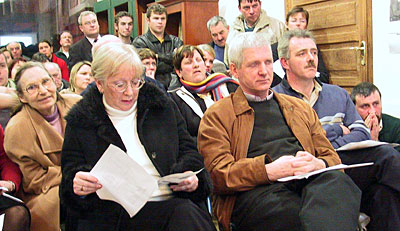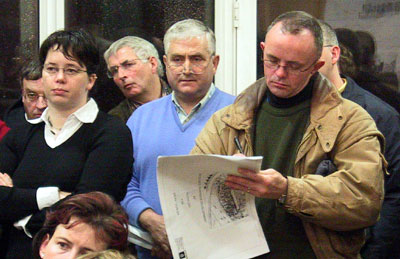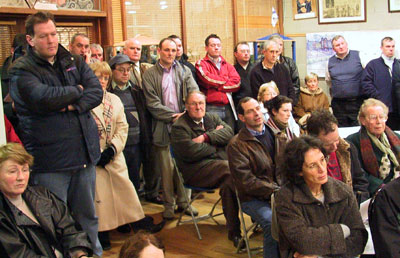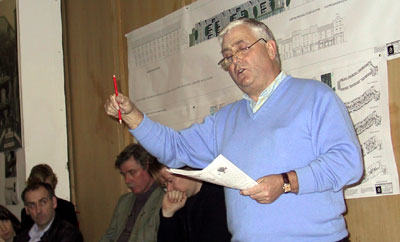
13 January 2004: It was fitting or ironic, depending on point of view, that Kilcullen's 'Garage Man', Pat Dunlea, was last night defending his Kilcullen Town Centre development proposals in the Heritage Centre attached to the Town Hall Theatre.
Because without Pat Dunlea and his love for his home town, neither that Heritage Centre or the theatre would likely exist.
They are both bricks and mortar examples of how he thinks, how he does, and what results.
But all that is by the by. Last night's meeting, called by Kilcullen Community Action to discuss a plan for a 4/5-storey apartments and retail development on the bank of the Liffey opposite the town's Valley Park, attracted around 200 people.
During the presentations, I was reminded of the official opening of the Valley Park back in the 70s, when one of the highlights of the day was the attempts by many people to cross the Liffey on a rope.
Most fell in. A few got to the other side. Most of those after a couple of tries.
And in a similar way, maybe this proposition, currently under consideration as a planning application by Kildare County Council, is but the first attempt to actually do something with the dead 'heart' of Kilcullen.
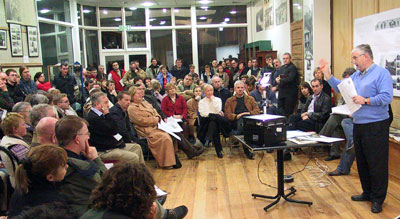
That was one of Pat Dunlea's key pleas to the assembly. "The square will become more than a parking lot," he said. "There are only eight or nine people now living in the town centre, but this plan will bring life back into the centre of town."
He said the development proposed is 'as natural to the development of Kilcullen as night follows day'.
"Nothing is permanent, change is ongoing," he concluded. "If this goes ahead, I will rest easy that I have done nothing wrong, but I will have done the best I can to move Kilcullen forward."
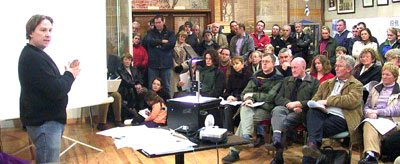
His architect, Kealan McCluskey, said the site is strategically the most important in the town and has the potential to be the 'fulcrum' for Kilcullen's future.
"It is a most important amenity, and it is not being used," he said. "It is the core of the town, but it needs urgent action. It is the most incredible site I have ever had the opportunity to work on."
Mr McCluskey showed examples of traditional mill and ecclesiastical architecture in Ireland to demonstrate that the scale of the building was not alien to Irish tradition.
In the town itself he suggested that the Cross and Passion College and the Parochial House were themselves such examples.
The development, he said, would provide visitors with a place to feel that they were 'in' Kilcullen. "At the moment, you could very easily pass through Kilcullen and not even know there's a river there."
And he defended the modern style of the proposed buildings by saying that copying something like a Georgian streetscape 'wasn't appropriate'. "We're living in 2004, not in 1890," he said.
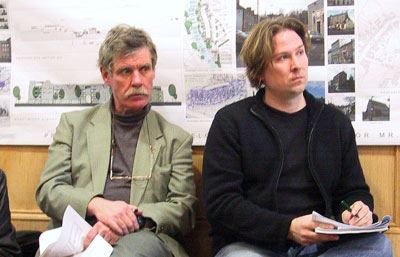
The proposal, which includes moving the Kilcullen Canoe Club to a location further upstream that would be more suitable to their needs, envisages at a later date a new footbridge across the river which would 'enable people to engage with and traverse the river'.
Mr McCluskey also referred to what had happened to Sallins in recent years, as a 'sorry tale' when it spread to a dormitory position in the 'pushing outwards from Dublin'.
"The only way not to have that happen here is to develop the centre of Kilcullen. Do this and you will end up for all time with a wonderful amenity space."
He concluded by saying that the proposed development offered a 'focus to the core of the town which at present isn't there'.
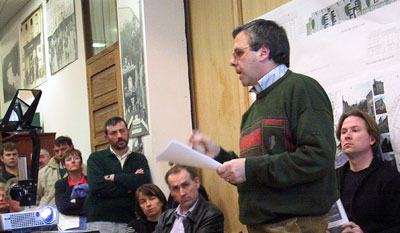
Presenting the other side of the argument, local resident Noel Clare first emphasised that he wasn't against development of the site in principle. And he acknowledged that Pat Dunlea in this enterprise has 'at heart the best possible intentions' for Kilcullen.
"But I think he is misguided," he went on. "I'm making a plea for the heart and soul of Kilcullen, for the protection of the town as we know it."
Saying that the proposal would set a precedent for 'the destruction of the streetscape' he suggested that other 3/4-storey buildings which would inevitably follow would, among other things, see the elimination of a number of cottages that were part of the existing fabric of the street.
He quoted sections from the Kilcullen Town Development Plan, the National Spatial Strategy, and from the Town Renewal Scheme which he believed would require Kildare County Council planners to reject the proposal.
He said the development as proposed would 'diminish the character of the Market Square', and that it is totally out of harmony with the streetscape 'particularly where it impacts on the square'.
"Also, the seclusion and privacy of the Valley Park will be gone, the density is too high, and we will end up with a 'gorge effect' in the area."
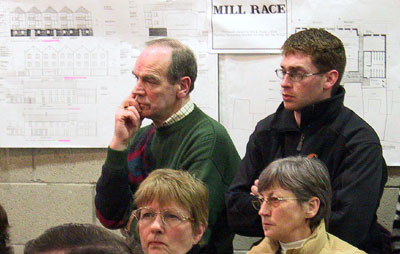
He suggested that the residential buildings on the edge of the square which had been acquired by Pat Dunlea should be preserved in any development.
"We also need to reduce the height and decrease the proposed density. Fifty-five town houses in the centre of Kilcullen is not what Kilcullen is about."
Asking that the proposed development also be moved away from the river bank, he concluded by saying that 'we can have our shops, and our apartments, and it will be great - but let's change it."
The meeting then went into a session of questions and answers which lasted for an hour and a half.
Kilcullen Community Action is likely to discuss the proposal at its own meeting on Wednesday night. The meeting is open to the public.
